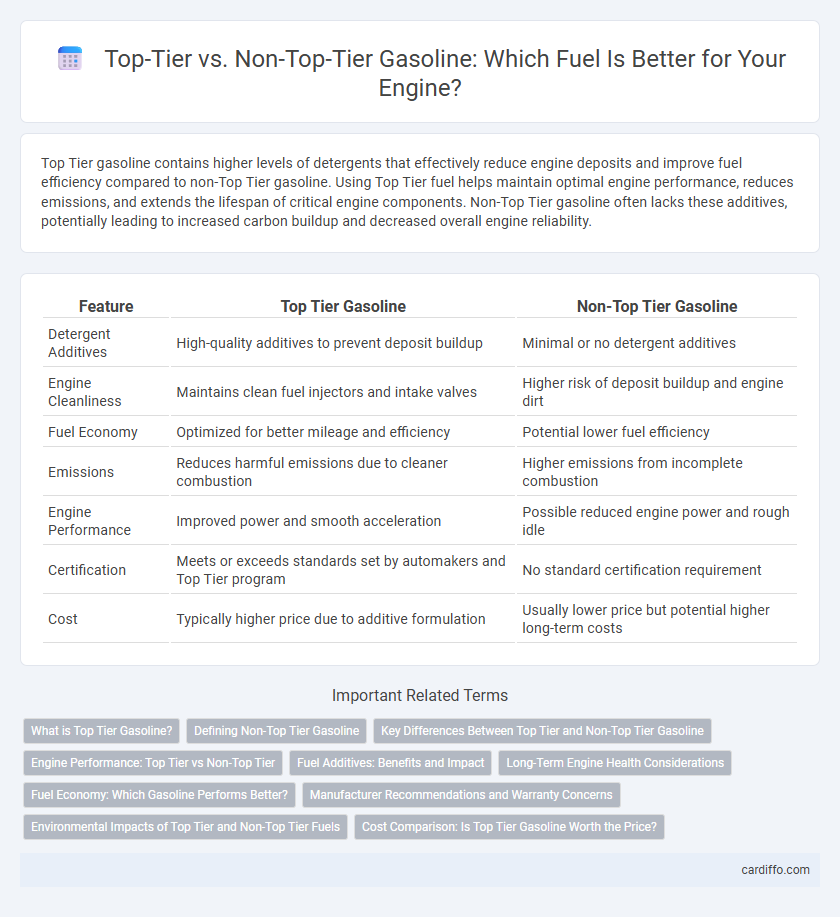Top Tier gasoline contains higher levels of detergents that effectively reduce engine deposits and improve fuel efficiency compared to non-Top Tier gasoline. Using Top Tier fuel helps maintain optimal engine performance, reduces emissions, and extends the lifespan of critical engine components. Non-Top Tier gasoline often lacks these additives, potentially leading to increased carbon buildup and decreased overall engine reliability.
Table of Comparison
| Feature | Top Tier Gasoline | Non-Top Tier Gasoline |
|---|---|---|
| Detergent Additives | High-quality additives to prevent deposit buildup | Minimal or no detergent additives |
| Engine Cleanliness | Maintains clean fuel injectors and intake valves | Higher risk of deposit buildup and engine dirt |
| Fuel Economy | Optimized for better mileage and efficiency | Potential lower fuel efficiency |
| Emissions | Reduces harmful emissions due to cleaner combustion | Higher emissions from incomplete combustion |
| Engine Performance | Improved power and smooth acceleration | Possible reduced engine power and rough idle |
| Certification | Meets or exceeds standards set by automakers and Top Tier program | No standard certification requirement |
| Cost | Typically higher price due to additive formulation | Usually lower price but potential higher long-term costs |
What is Top Tier Gasoline?
Top Tier Gasoline is a performance and engine cleanliness standard established by major automakers to ensure superior detergent additives in fuel. This gasoline formulation helps prevent deposit buildup on intake valves and fuel injectors, enhancing engine efficiency and reducing emissions. Choosing Top Tier Gasoline supports optimal engine performance and long-term vehicle reliability compared to non-Top Tier gasoline.
Defining Non-Top Tier Gasoline
Non-Top Tier gasoline refers to fuel that does not meet the rigorous detergent additive standards set by the Top Tier certification, which means it may contain fewer or less effective additives for engine cleanliness. This type of gasoline can lead to increased carbon deposits on critical engine components, reducing fuel efficiency and potentially causing long-term engine performance issues. Non-Top Tier fuels are often sold by smaller or non-major brands lacking the commitment to superior detergent content required to prevent harmful deposit buildup.
Key Differences Between Top Tier and Non-Top Tier Gasoline
Top Tier gasoline contains higher levels of detergent additives that effectively reduce engine deposits, improve fuel efficiency, and lower emissions compared to non-Top Tier gasoline. Non-Top Tier fuels often lack rigorous additive standards, which can lead to increased engine wear, reduced performance, and higher long-term maintenance costs. Using Top Tier gasoline supports cleaner engine operation and enhances combustion stability, resulting in better overall vehicle performance.
Engine Performance: Top Tier vs Non-Top Tier
Top Tier gasoline contains higher levels of detergent additives that prevent carbon deposits in the engine, ensuring cleaner fuel injectors and intake valves, which directly enhances engine performance and longevity. Non-Top Tier gasoline lacks these enhanced detergents, leading to the buildup of deposits that can reduce engine efficiency, cause knocking, and increase emissions. Choosing Top Tier fuel supports optimal combustion, smoother acceleration, and improved fuel economy compared to non-Top Tier options.
Fuel Additives: Benefits and Impact
Top Tier Gasoline contains higher-quality fuel additives that effectively reduce engine deposits, improve combustion efficiency, and enhance overall vehicle performance. These additives help maintain cleaner fuel injectors and intake valves, leading to better fuel economy and lower emissions compared to Non-Top Tier Gasoline. The advanced detergent formulations in Top Tier fuel protect critical engine components, contributing to long-term durability and reduced maintenance costs.
Long-Term Engine Health Considerations
Top Tier gasoline contains higher levels of detergent additives that prevent deposit buildup on fuel injectors and intake valves, contributing to improved long-term engine performance and fuel efficiency. Non-Top Tier gasoline lacks these enhanced detergents, increasing the risk of carbon deposits that can reduce engine power and increase maintenance costs over time. Consistent use of Top Tier gasoline supports engine longevity by maintaining cleaner combustion chambers and reducing wear on critical engine components.
Fuel Economy: Which Gasoline Performs Better?
Top Tier Gasoline contains higher levels of detergent additives that prevent engine deposits, leading to more efficient combustion and improved fuel economy compared to Non-Top Tier Gasoline. Studies show vehicles using Top Tier fuels can achieve up to 3% better mileage by maintaining cleaner fuel injectors and intake valves. Non-Top Tier gasolines often result in carbon buildup that reduces engine performance and lowers miles per gallon over time.
Manufacturer Recommendations and Warranty Concerns
Top Tier gasoline meets strict detergent standards set by automakers to prevent engine deposits, ensuring compliance with manufacturer recommendations and maintaining vehicle warranty validity. Using non-Top Tier gasoline may lead to increased engine deposits, potentially voiding warranty coverage due to failure to meet manufacturer fuel specifications. Vehicle manufacturers often specify Top Tier gasoline to safeguard engine performance, emissions, and long-term reliability as outlined in their warranty agreements.
Environmental Impacts of Top Tier and Non-Top Tier Fuels
Top Tier Gasoline contains higher concentrations of detergents and additives that reduce engine deposits, improving combustion efficiency and lowering harmful emissions like carbon monoxide and nitrogen oxides. Non-Top Tier Gasoline often lacks these advanced additives, leading to increased engine residue buildup and higher pollutant outputs, contributing to air quality degradation. Choosing Top Tier fuels supports cleaner vehicle operation, thereby reducing environmental impacts related to smog formation and greenhouse gas emissions.
Cost Comparison: Is Top Tier Gasoline Worth the Price?
Top Tier Gasoline typically costs 10 to 15 cents more per gallon than Non-Top Tier alternatives, reflecting its higher detergent additive standards that promote engine cleanliness and efficiency. Studies indicate Top Tier fuels reduce engine deposits, potentially lowering maintenance costs and improving fuel economy over time, which can offset the initial price difference. Choosing Top Tier Gasoline can lead to long-term savings and enhanced engine performance despite the higher upfront cost.
Top Tier Gasoline vs Non-Top Tier Gasoline Infographic

 cardiffo.com
cardiffo.com